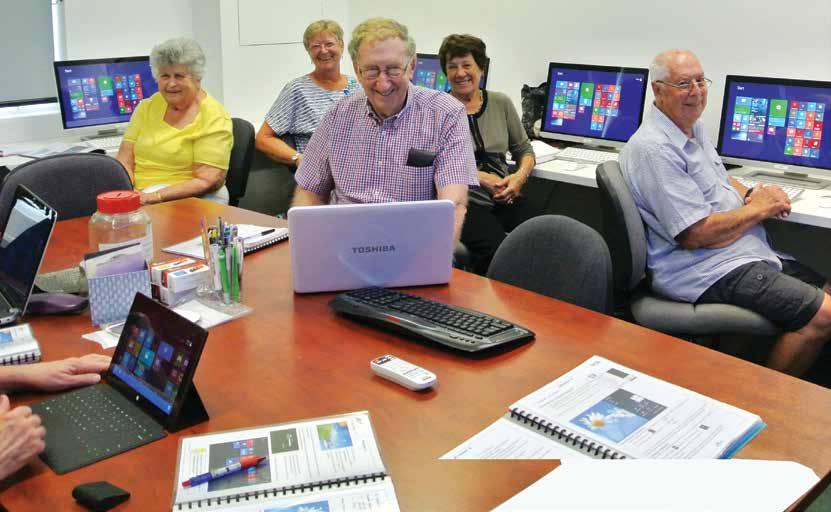
4 minute read
For The Joy of Learning: U3A
Our relaxed coastal lifestyle certainly encourages equality among retirees. With our laid back relaxed dress code, few care about anyone’s previous career background or academic achievements. Nowhere is this more relevant than in the classrooms of U3A courses being offered on the Sunshine Coast.
Words Tricia Welsh
Advertisement
Wayne Curran, Tutor and Course co-ordinator at U3A Sunshine Coast, liaises with 110 tutors covering some 136 courses each year, Wayne points out: “You don’t have to be a teacher, but rather have a passion for your subject, and try to make it fun. Our mature age students are very encouraging – and forgiving.”
One tutor known for his enjoyable classes is Ian Cran whose classes fill up quickly. He shares his considerable knowledge and passion about a wide variety of subjects: classical music, geography of Scotland, birds of the Sunshine Coast and more. “He’s quite a character,” says one of his loyal students. “He loves to tell yarns and he’s led an incredibly varied life. He always makes the topic both interesting and fun.”
The members of the University of the Third Age are those in the ‘third age’ of their life - ‘the life period of active retirement, which follows the first age of childhood and formal education and the second age of working life.’ They still want to either contribute to the community or participate in what this all-volunteer not-for-profit organisation has to offer.
Two Sunshine Coast stalwarts are long-term tutors Myra Timmerman who at 84 still teaches yoga, and founding member Mara Miller, 97, who for many years taught creative writing and history.
Initiated by a group of retired academics at the University of Toulouse in southern France in 1974, the U3A concept soon spread to the United Kingdom where it evolved with greater community participation. Ten years later, Australians embraced the UK model with the first branch opening in Melbourne. Today, there are some 250 branches in Australia with a total of 104,000 members.
In Queensland, the first U3A was formed on the Sunshine Coast in 1986. There are now some 2,200 members attending courses that are held in various venues along the coast, from Coolum in the north, to Mudjimba, USC at the Sippy Downs campus, south to Caloundra, and west to Maleny and Nambour.
Courses, activities and lectures have no academic prerequisites and the choices on offer are limited only by the wealth of knowledge and life experiences of those members who offer to be tutors.
And there are no formal results, other than a real sense of achievement in completing a course, or learning a new skill, whether academic or arts and crafts, exercise or social activity. Courses in health, fitness and sport include bowling, gym fitness, Tai Chi, Yoga, table tennis, golf, lawn bowls, cycling and more.
Some of the newest courses offered include organic beekeeping, Chinese for beginners, I Love Maths and ballroom dancing.
One of the most popular sports in recent years has been pickleball which has been likened to a cross between tennis, table tennis and badminton. Starting out with just one class, interest has grown so fast they now offer five.

President of U3A Sunshine Coast, Glyni Cumming – a former Head of English at a private girls’ school for 16 years, joined U3A seven years ago to play table tennis and gave classes in Ancient History before joining the Management Committee. She’s been president for two years now and says: “For many of our members, U3A plays a very significant part in their lives. Attending various classes each week has brought them such fun and mental stimulation, and they really love being a member.”
An internationally recognised scholar in gerontology, Professor Helen Bartlett was keynote speaker at the U3A Sunshine Coast’s AGM this year. Professor Bartlett, the new Vice-Chancellor of the University of the Sunshine Coast (USC), said research had shown that continued engagement in learning activities, especially on a weekly basis, really does increase the ongoing motivation that impacts on mental and physical health. “It provides … friendships and connections, reducing the risk of social isolation in later life.”
“Where the benefits have really been shown to be effective is with the informal learning such as people experience in U3A classes, a learning activity that doesn’t result in formal qualifications but appeals in increasing knowledge in an area of interest or helping to create hobbies. These informal learning activities are definitely linked with improved social and psychological wellbeing.”
Your writer is learning French from English-born Patricia Barry, who has spoken French since her childhood education at a convent school run by French nuns. She spent much of her youth in France, received several scholarships to study French at university in France and more recently taught French at a prestigious Brisbane boys’ school. When she retired, she joined U3A to join a French class but was soon asked to take a class of her own. She started with 10 students and a beginners’ class; today she has four eager classes of 25 and two years ago was nominated for the Sunshine Coast’s Australia Day Senior Citizen of the Year award.
Patricia affirms “I think U3A is a brilliant organisation as there is a huge range of activities that people can enjoy, especially if you come up to the coast and you may be lonely, a ‘newbie’. You can join U3A and do something interesting, find people who are like-minded and make friends for life. To me, that is the strength of U3A.”
U3A Sunshine Coast’s office is within the USC campus. Annual membership is $40 but venue fees are charged to cover the cost of hall hire for individual courses. Phone 5430 1123, email u3aoffice@u3asunshine.org.au or visit u3asunshine.org.au

Connect
WEBSITE www.u3asunshine.org.au
PHONE 07 5430 1123

